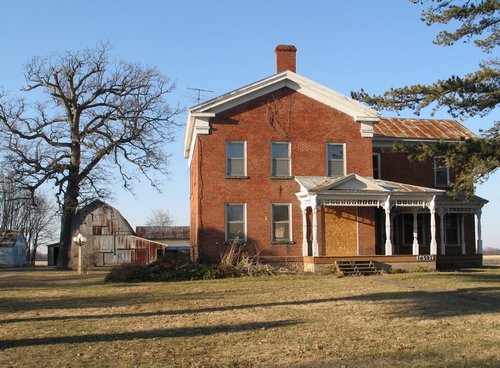Because of what happened today, I meant to include more in that last post about Free-Range kids. I’ll put it here instead.
Today just before I was about to tell my wife about Free-Range Kids and some of the recent discussions there, she told me some bad news. There had been a murder yesterday at Galesburg, on Miller Drive near the Shell station. It seems that a 67-year-old man (she said 70 when she told me about it) shot and killed a teen-age girl who had been doing some work at his house. Another girl with her, her sister, was shot, too, but ran to the Subway at the Shell Station, where there happened to be a police officer. There may have been a sexual assault, and the man shot himself in the end.
I don’t know these girls but am afraid I’ll find out that they are friends of friends. I know that street and some people who live there. We once used the services of the doctor who owns the house. I’ve ridden my bike there a few times. I sometimes stop at that Shell station on my way back home from a long bike ride. It’s a place to cross the Kalamazoo River. But more often I cross the river near the other end of Miller Drive. Either way, it’s all too close to home in more ways than one.
So how, then, can I defend that mother who kicked the kids out of the car a few miles from home? And how can I defend Lenore Skenazy when she argues back against a law-enforcement officer who wrote the following:
“I work in law enforcement in the child predator unit in a mid-size city. Kids meeting people on the Internet is the tip of the iceberg. It doesn’t sound like anyone here has any idea of the extent that perpetrators use new technologies to victimize. I won’t “bore” you with details since you don’t think this stuff can happen to you anyway. No one does.
“But it is kind of sad to me to see how proud people are to wave off their responsibilities to keep their kids in check.”
First, I’m not exactly defending the mother’s decision, though I am defending her against a government that would arrest her for making it. And it’s not a matter of thinking this stuff can’t happen to you.
Even back in the 1950s, in rural North Dakota, parents knew there were bad people. In fall of 1956, when I was 8, my younger brother and I attended a one-room school a half a mile or so from home, along one of the few paved highways in that part of the world. I don’t think there were any other homes between ours and the school. It was a sparsely settled area. We walked to school and back. I was envious of an older boy who sometimes rode his horse to school and kept it in a little stable out back during the day. But even in that world, my mother told us not to accept rides or anything else from strangers.
One day on the way home after school, we were offered a ride in a horse-drawn wagon or sleigh, I disremember which, that was hauling some of the other kids we knew. It looked like they were having fun, but Mom had told us not to accept any rides from strangers, and I didn’t recognize the man driving the team, even though I thought I recognized some of the other people. I don’t remember what words I said for refusal — maybe I just shook my head — but I grabbed my brother’s arm and walked further away in the ditch. (The ditches are really wide in North Dakota.)
I didn’t say anything about it when I got home — there are lots of things I never told my parents even at that age — but they later heard about it. They asked me about the incident and after I confirmed what they had heard, they laughed, saying it would have been OK to take a ride with them. Well, just because they knew the man didn’t mean I did.
That was a somewhat different world than Galesburg, Michigan in 2009. But it’s not that people then and now don’t think there are bad people who might do bad things to children. That law-enforcement officer is mistaken when he says people don’t think this stuff can happen. They know all too well. It’s just that parents are making decisions about how best to bring up children to live in this world, and are not letting the dangers be the only determining factor. And even when the dangers factor largely in their decisions, the solution is not always to hide the kids away from the world.

